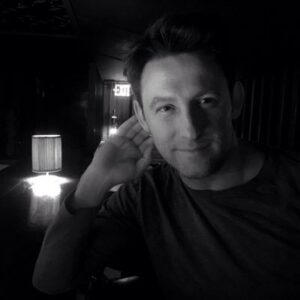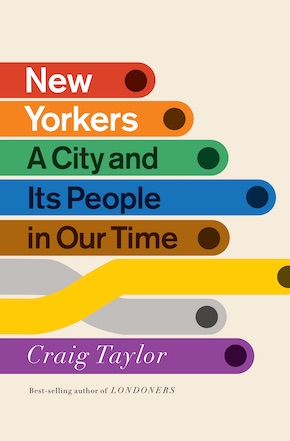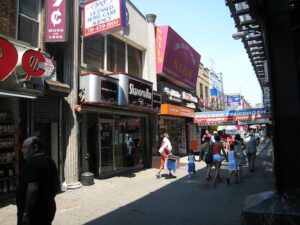Nasim’s story
by Craig TaylorI moved to New York in January 2014 to start reporting New Yorkers. I had spent the previous decade researching, reporting and writing two books about other places. They were based on my experiences interviewing a wide array of people to get a feel for their lives, their work and the places they made. For the first one, Return to Akenfield, I had spent a couple of months in an English village with hunters, farmers, apple pickers, priests, publicans, teachers and shopkeepers, commuters and retirees, and a gnarled old rag-rug maker, all in an effort to capture rural life a generation after Ronald Blythe’s classic 1969 book Akenfield. As a follow-up I spent five years walking the streets and squares of London, interviewing Londoners. The book that resulted, Londoners, presented a contemporary portrait of the city from more than eighty voices, street sweepers to investment bankers, a manicurist to a dominatrix.
Neither of these books were about places I’d grown up knowing; I had moved to London from a seaside village in western Canada. But not knowing a place, not being of a place, left a space for others to step forward to explain. I imagined there would be no lack of candour. I only knew that I wanted to craft a book about New York in the twenty-first century, filled with the voices and sounds and places and people of New York, the life of the city right now. A book that would capture the richness of its conversation, the complaints and quiet admissions of a city in flux; and one that would weave together the voices of an enormously diverse city: people from every borough, the rich and the poor, young and old, immigrant voices and native, those emboldened by the city as well as those who’d felt its sharp edge.
NASIM ALMUNTASER – a bodega employee
I’m a Yemeni-American, bred and born in Brooklyn, New York. My father, he was actually a school leader at Yemen, but when he came to America, his degrees couldn’t transfer. He came here for the American dream – which is, you know, for his children to get the American dream, to be educated, to do things that he wasn’t able to do. He never had that opportunity to get a college degree and work in other kinds of institutions and get to explore what America is about. His transition was so fast and overwhelming. The bodega, it was the quickest thing.
We have two in downtown Brooklyn – many years ago it was really poor and now it’s very high class. And we have two in Brighton – a very busy neighborhood. Brighton Beach never is quiet. I’ve been working in the bodegas assisting my parents in all four of them across New York City for the past ten years.
I’ve been assisting lately at Brighton Beach, which is a predominantly Russian, Ukrainian and Uzbek community. At the moment I’ve been taking cashier responsibility because of my language and I’m a people’s person and I’m very outgoing. I try to help people to the best of my capacity. We have plenty of consistent customers. We hold stuff if there’s a customer that likes one thing. In terms of our most consistent customers, we get so it’s like we forget they’re our customers. They turn into some sort of very, very close friend. Our conversations tend to get deep, right? Certain things that you won’t tell someone that you don’t know. We tend to open up to our customers too. So it’s reciprocal, bringing some sort of community within the store.
People in New York City are very materialistic. I mean, Brighton Beach, it’s all money, money, money. If you look at other countries, people actually communicate with each other. But a place like Brighton Beach? It’s really good in terms of business, but in terms of social life, it’s hard. People are always running by, walking by each other and you, and if you say hi, how are you? or start a dialogue with someone, that’s one of the most awkward things you can do. But we try to do that in the store. You know, to build some sort of community.
Owning a bodega is not just being a businessman, right? I think it has to do something with the arts or something, being like morally and socially responsible and knowing who your audience is and knowing who your customer is, knowing your community. Being patient, a listener, a leader, being helpful, courteous, courageous, and taking risks. Risks in terms of your neighborhood. Especially for those that have been owning bodegas for like twenty years. They’ve seen the neighborhood go from poor to rich or rich to poor, and your items, the things that you sell, reflect that.
I think it’s about being a listener too, which is what builds that community. Sharing with people what’s going on in your life because it’s not just you giving. Customers bring something to the business besides the business.”
If you have a poor neighborhood, your prices tend to drop or tend to be very different. Poor people like certain things. If it’s predominantly African American, the kind of produce you sell would try to lean towards their culture. Because you need to be open, an openminded person, you need to be open to the community change, the culture change, and make sure that your shop reflects that.
If you were to ask people about Muslim holidays like Eid or Ramadan, a lot of them would not even know what those holidays are. People see a lot of stores selling things that come from that culture, like the candy and treats that we sell. A lot of people say, What is this? I’ve never seen this before. Why is this coming out during this time of the season? So it’s reciprocal learning. I think the products also have some sort of voice too.
Before you enter in, you see a huge display of fruits and vegetables. So usually on the right side we have vegetables, potatoes, broccoli and onions. As you get towards the door, you see apples, strawberries, cucumbers. And then on the other side is the remaining produce like peaches, blueberries and avocados. I mean it’s not the traditional Russian food, right? But in terms of fruits and vegetables, we try to implement a little bit of our neighborhood’s culture. So we have Russian yogurt, Russian desserts, Russian ice cream, and we’ll mix it up with other traditions, like the Arabic food, baklava, and treats.
Some of them are Spanish too, ’cause we do have Spanish populations. It’s not like the Russian community comes into the store and buys only the Russian produce. Some of them look at the Spanish food that we have and they’re like, Oh, that’s a good thing. Let me try that.
I’ve never come to work with such fear and anxiety until the coronavirus came along.
We’ve been really worried about the two bodegas in Brighton Beach, because some of our employees do have masks and some of them don’t. They would just wear a bandana. Some don’t wear one at all. We’re just really risking our lives. I don’t want to take this home either.
I’ve had several customers come to me and tell me one of the most drastic things that had happened in their life – a person passed away. People dying from coronavirus. I have a few of my friends that have gone from coronavirus. I think it’s about being a listener too, which is what builds that community. Sharing with people what’s going on in your life because it’s not just you giving. Customers bring something to the business besides the business.
Now that we’re one of the very few stores that are open twenty-four hours, I noticed not just people running away from each other and being germaphobic but people actually coming out and asking, How are you? Do you need any help? In every crisis – hurricane, tornadoes, any crisis – people tend to come together. I hope that one of the main lessons that these times are teaching us is to stay connected and hold on to the fabric.
Around March when they were talking about it, it wasn’t taken as seriously because no one was really sure if it was true, the virus. But then towards April is when we started taking proper precautions as we try to learn from our customers. Our customers and our community teach us at the same time. And so I feel like there is some, again, reciprocal learning going on.
Our customers, we try not to touch their stuff as much as we can. So if they’re paying by credit card, debit card, food stamps, we try to have them do it themselves. But unfortunately we have to weigh stuff. We have to touch the stuff. It’s overwhelming. The gloves and the masks – it was like an extra layer on us. It’s like wearing a winter coat in the summertime.
A lot of customers feel very uncomfortable with us touching their items, weighing them, after we’ve touched money. I try my best to change my gloves as much times as I can. But the amount of times I change basically reflects how many I have. I can’t change them every hour if I don’t have a lot. If I don’t have any, I can only change them twice a day.
They would tell me things about their grandparents. I would remember them as if they were my family. And now no one wants to have conversations anymore. Let’s talk less and get home quick. It’s so dead.”
Sometimes I think coronavirus is within my hands. Or sometimes it’s in the register. And that irks me so much because part of that comes with the disrespect customers give to us when they give us cash. Many of them, prior to this virus, would hand us cash. Now they just throw it at the counter. Literally, they throw it. Sometimes I’m fetching, like it’s some sort of baseball. I’m like, So do they have the virus and they’re not admitting the fact? Or they’re doing that because they think we’re dangerous?
What did they touch? What did they come in with? What just came out of their house? Where was this dollar bill last placed? We can talk financially, we can talk personally, we can talk socially, we can talk from all these different ends. But the main fear is, where has this dollar bill last been placed?
It’s like survival of the fittest. Everyone is on unemployment, prices are skyrocketing high. A lot of things we don’t even have, we can’t get because markets are closed and those that we can get – there’s a huge inflation, in terms of the prices gone real high.
Some people, when I tell them to put a mask on, you know where the mask is? It’s in their pocket. So they just pull it out of their pocket. I’m like, So what’s the point of you carrying it with you? It’s meant to be put on your face.
These people, I would always ask them, How are your grandparents doing? They would tell me things about their grandparents. I would remember them as if they were my family. And now no one wants to have conversations anymore. Let’s talk less and get home quick. It’s so dead.
Obama once said that a change is brought about because ordinary people do extraordinary things, right? And I think at this moment we are the ordinary people. And we are doing extraordinary things.
from New Yorkers: A City and Its People in Our Time (John Murray, £25)
 Craig Taylor grew up in a village called Lantzville, just outside Nanaimo, British Colombia. He moved to London in 2000, to New York in 2014, and is currently back in western Canada. He is the author of Londoners: The Days and Nights of London Now – As Told by Those Who Love It, Hate It, Live It, Left It and Long for It, Return to Akenfield and One Million Tiny Plays About Britain, which began life as a column in the Guardian newspaper. Since 2008 he’s edited the magazine Five Dials for Hamish Hamilton, an imprint of Penguin Books. New Yorkers is published in hardback, eBook and audio download by John Murray Press.
Craig Taylor grew up in a village called Lantzville, just outside Nanaimo, British Colombia. He moved to London in 2000, to New York in 2014, and is currently back in western Canada. He is the author of Londoners: The Days and Nights of London Now – As Told by Those Who Love It, Hate It, Live It, Left It and Long for It, Return to Akenfield and One Million Tiny Plays About Britain, which began life as a column in the Guardian newspaper. Since 2008 he’s edited the magazine Five Dials for Hamish Hamilton, an imprint of Penguin Books. New Yorkers is published in hardback, eBook and audio download by John Murray Press.
Read more
craigdtaylor.com
craig_d_taylor
@CDLTaylor



